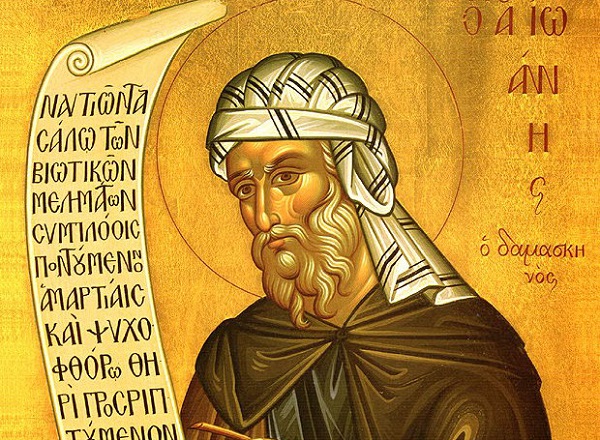What the Son of God Achieved
5 Δεκεμβρίου 2017
Saint John the Damascan (feast-day 4 December)
For now the adoration of demons has ceased; creation has been sanctified by the divine blood; the altars and temples of idols have been overthrown; the knowledge of God, the consubstantial Trinity, has been planted [in our minds]; the uncreated divinity, the one true God, Creator and Lord of all, is worshipped; virtues are cultivated; the hope of resurrection has been granted through the resurrection of Christ; the demons, who once held us in thrall, now tremble. And what is miraculous, indeed, is that all this has been successfully brought about by His cross and passion and death. Throughout the whole earth, the Gospel of the knowledge of God has been preached not through wars or weapons or armies being used to rout the enemy, but by only a few, naked, poor, illiterate men persecuted, tormented, who, at risk of death, preached Him Who was crucified in the flesh and died, and who thus became victors over the wise and the powerful. For the omnipotent power of Christ crucified accompanied them. Death, which was once the thing that we humans feared above all else, has been overthrown. That which was once the object of hate and loathing is now preferred to life. These are the achievements of Christ’s presence, these are the tokens of His power. For it is not one people that He has saved, as when, through Moses, He divided the sea and delivered Israel out of Egypt and the bondage of Pharaoh. Rather, He has rescued all of humanity from the corruption of death and the bitter tyranny of sin, not bringing them to virtue by force, nor burying them with earth or burning them with fire, or ordering the sinners to be stoned, but by persuading us by gentleness and long-suffering to choose virtue, to outdo one another to attain it and to find pleasure in doing so. Formerly, it was sinners who were persecuted, and yet they clung all the closer to sin, which they looked upon as their god. But now, for the sake of piety and virtue, people choose persecution, disfigurement and death.

All praise to You, Christ, the Divine Word, Wisdom and Power, and Almighty God. What can we, who are so impoverished, give in return for all this? For all things are Yours and You ask nothing of us, other than we be saved. It is You Who give this, yet, in your unutterable goodness, You are grateful to those who receive it. We are thankful to you for granting us our existence and true life. When we fell away from this, You brought us back to it by Your ineffable kindness.
Extract from chapter 77 of An Exact Exposition of the Orthodox Faith.
Saint John is a towering figure in the Church for three reasons:
a) He wrote The Fount of Knowledge, a dogmatic work in three parts: Philosophical Chapters, dealing with logic and essentially preparing readers for the rest of the book; On Heresies, the last chapter of which contains an early refutation of Islam, with which he was well acquainted, given that he had once been a high official at the court of the Caliph; and An Exact Exposition of the Orthodox Faith, an excellent summary of the teachings of the Fathers.
b) Living as he did outside the boundaries of the Empire of New Rome (Constantinople), he was able to oppose the policies of the iconoclast emperors. He expressed his vigorous support for the veneration of icons in three Apologetic Treatises against those Decrying the Holy Images. Though it would be an exaggeration to claim that his role in the controversy was crucial, he certainly made a very effective argument which helped win the day for Orthodoxy.
c) He was a wonderfully gifted hymnographer. He played a major part in establishing the Canon as part of Orthodox worship; composed the hymns in the Octoechos, the hymns in eight tones, which have served as a model for later compositions; wrote the Easter canon; at least parts, if not all, of the Burial Service; and some of our most beautiful and familiar hymns to the Mother of God.
One of his minor works was an encomium to Saint Barbara. It may be no coincidence, then, that they share the same feast day.





